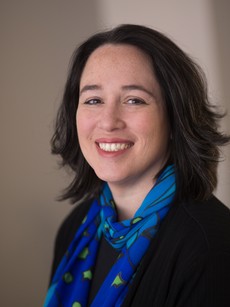By Kayla Britt, MS&T Editor
Over 30 percent of people in Adams County, right here in Gettysburg, qualify for SNAP: the Supplemental Nutrition Assistance Program. As shocking as that statistic may be, some of the realities behind the sources of the food on our plates every day are even more unfortunate. Dr. Roni Neff spoke to an audience of students, faculty, staff and community members on Thursday, October 20, about food systems and food justice in the United States.
Dr. Neff is an Assistant Professor at Johns Hopkins University Bloomberg’s School of Public Health and the Department of Environmental Health Sciences. She also serves as Director of the Center for a Livable Future’s Food System Sustainability and Public Health Program at JHU. She believes that access to adequate food is a human right, and the present systems deny many people that very right.
SNAP has played a pivotal role in reducing hunger in the U.S. – however, there have been attempts to slash SNAP funding, which places potential risk on many people who rely on the benefits of the program. In addition, when we talk about hunger, we also need to talk about what people are eating. People are food insecure and are at the highest risk for being overweight and obese partially due to processed foods being cheaper and easier to access.
Thankfully, there are programs working to fight against these issues; the Healthy Options program provides an option for double dollars, where dollars spent on fresh produce go twice as far. In addition, programs like the Gleaning Project and Campus Kitchens work to re-direct food that would otherwise be wasted to the people who need it.
Dr. Neff also touched on the health disparities that result from food injustice. African Americans have a 146 percent increased risk of stroke and more than double the risk of diabetes compared to Caucasian Americans. Historical community racial segregation aligns closely with food deserts: places that lack access to affordable and nutritious food. The causes and relationships are complex, and there is not an easy fix.
It is important to recognize that people in the community know what their needs are and what would benefit them. We need programs that incorporate the people that the programs intend to help. For instance, some black churches have initiated food security networks and community gardens which epitomize the concept of “by the community, for the community.”
The treatment of people who process, prepare and serve our food is also a major concern. 80 percent of minimum wage workers have no paid sick days, which means many workers go to work sick and risk spreading infections to other people. Low wage workers are also often exposed to sexual harassment and are even at risk for slavery. There was an investigation last year by the Associated Press which revealed widespread slavery in the seafood industry.
By recognizing the connecting between these different issues, we can build solidarity, leadership and reflection. “All people need to feel safe and feel heard, and need a piece of the proverbial ‘American Dream,’” quoted Dr. Neff. Once we recognize that these inequalities exist and understand how they affect our communities, we can work to achieve that goal.

